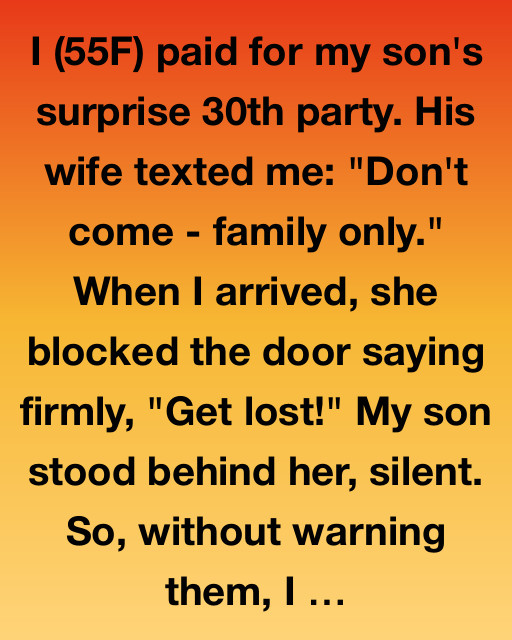
I’m 55, and I’ve always been the kind of mother who gives everything for her family.
My son, Ethan, has been my pride and joy since the day he was born. I raised him mostly on my own after his father passed away when Ethan was ten. I worked double shifts, skipped vacations, and made sure he had every opportunity I never did.
When he got married two years ago to a woman named Claire, I was genuinely happy for him. She seemed polite at first—sweet, attentive, the kind of daughter-in-law I thought I could bond with. But slowly, little things started to change.
Phone calls became less frequent. Invitations to family dinners “got lost.” Holidays were suddenly “too busy.”
Still, I told myself it was normal. Newlyweds need space. I didn’t want to be the overbearing mother-in-law stereotype, so I kept my distance and respected their boundaries.
Or so I thought.
A few months ago, I decided to do something special for Ethan’s 30th birthday. It’s a big milestone, and I wanted it to be unforgettable.
I secretly contacted his friends, booked a nice venue, arranged the catering, and even ordered his favorite cake—triple chocolate fudge with peanut butter frosting. I spent weeks planning every detail.
I wanted him to feel celebrated and loved.
Everything was ready, and the night before the party, I got a text from Claire.
“Hi, just letting you know we’re having a small surprise party for Ethan at the same venue. Don’t come—it’s family only.”
I stared at the message, confused. Family only? I am his family.
I tried calling her, but she didn’t pick up. I even texted Ethan, but he didn’t reply either. Something felt wrong.
After thinking about it all night, I decided to go anyway. After all, I’d paid for everything. I wasn’t going to be excluded from the celebration I’d planned.
When I arrived at the venue, music and laughter spilled out the door. I took a deep breath, clutching the gift I’d bought him—a silver watch engraved with the words, “Love, Mom.”
But before I could step inside, Claire appeared at the entrance, her smile vanishing the moment she saw me.
“What are you doing here?” she snapped.
“I came to celebrate my son’s birthday,” I said, trying to keep my voice calm.
Her eyes narrowed. “I told you not to come. This is for family only.”
“I am family,” I said quietly.
She stepped closer, her tone firm and cold. “You need to leave. You’re not welcome here.”
Behind her, Ethan stood frozen. He wouldn’t meet my eyes.
“Ethan,” I said softly, “are you really okay with this?”
He swallowed hard but said nothing.
That silence broke me.
So, without another word, I turned around and walked back to my car. My hands were trembling, but not from sadness—from something deeper.
Betrayal.
I sat there for a long time, watching through the windshield as people arrived—people I didn’t even recognize. Coworkers. Friends. Claire’s family.
But not me.
I had paid for that party—every bite of food, every decoration, every note of music—and I wasn’t even allowed through the door.
The humiliation burned, but underneath it all was something colder: resolve.
They wanted a party without me? Fine. But they were going to learn what it meant to exclude the person who made it all possible.
The next morning, I called the venue manager. I explained the situation calmly and asked for an itemized receipt—every charge, every payment, every tip. Everything had gone through my account.
Then, I made another call—to the catering company.
I learned that the balance for the event was due that morning. I had left it partially unpaid because the owner had told me I could finalize it after the event. Perfect timing.
I told them to cancel my payment authorization.
When the catering company followed up with Claire later that day, she was furious. She had to pay the remaining balance herself, nearly $2,000, and the venue added late fees when my authorization was pulled.
I won’t pretend it didn’t give me a small sense of satisfaction.
But that wasn’t the end.
A few days later, Ethan called me. His voice was low and uncertain.
“Mom, Claire’s really upset. Why did you cancel the payment?”
I took a deep breath. “Ethan, I didn’t cancel it to be petty. I canceled it because I paid for that party out of love—for you. But when your wife told me I wasn’t family, she made it clear my love wasn’t welcome there. So I took it back.”
He was silent for a long time.
Finally, he said, “She thought it would be awkward. She didn’t want tension.”
“Tension?” I repeated. “You stood there while your wife told your mother to ‘get lost.’ You didn’t say a word. That wasn’t awkward, Ethan—that was cruel.”
He didn’t argue. He just sighed and said quietly, “I’m sorry, Mom.”
But apologies mean little when they come too late.
Weeks passed before I heard from him again.
Then one evening, there was a knock on my door. When I opened it, Ethan was standing there alone, holding the watch I’d bought him.
“I never even got to open it that night,” he said softly. “Claire told me she didn’t want me to.”
He looked exhausted, and for the first time, I saw regret in his eyes.
“I didn’t stand up for you,” he admitted. “And I hate myself for it. Claire and I… we’ve been fighting ever since that night.”
I wanted to comfort him, but I also needed him to understand.
“Ethan, love shouldn’t make you choose between your mother and your wife,” I said gently. “But it should make you stand up when something’s wrong. Family isn’t who shares your address—it’s who stands by you when everyone else walks away.”
He nodded, tears brimming. “I know. I just hope it’s not too late.”
Months later, Ethan and Claire separated. It wasn’t just about me, he said. There had been deeper issues—control, isolation, manipulation. My situation had simply brought them to light.
It wasn’t the ending I wanted for my son, but it was a necessary one.
Now, he and I are rebuilding our relationship. Slowly, carefully. He comes over for dinner every Sunday, just like he used to. Sometimes, he helps me fix things around the house, or we just sit on the porch and talk for hours.
I don’t bring up the party. I don’t have to. We both know what it cost—not in money, but in lessons.
Because here’s what I learned:
You can give someone everything—your time, your love, your sacrifices—and they can still forget.
But when the truth reveals itself, as it always does, it’s not vengeance that brings peace. It’s boundaries.
I stopped being the woman who begged to be included. Now, I’m the woman who knows her worth.
And sometimes, the best gift you can give yourself… is walking away from people who don’t deserve a seat at your table.



